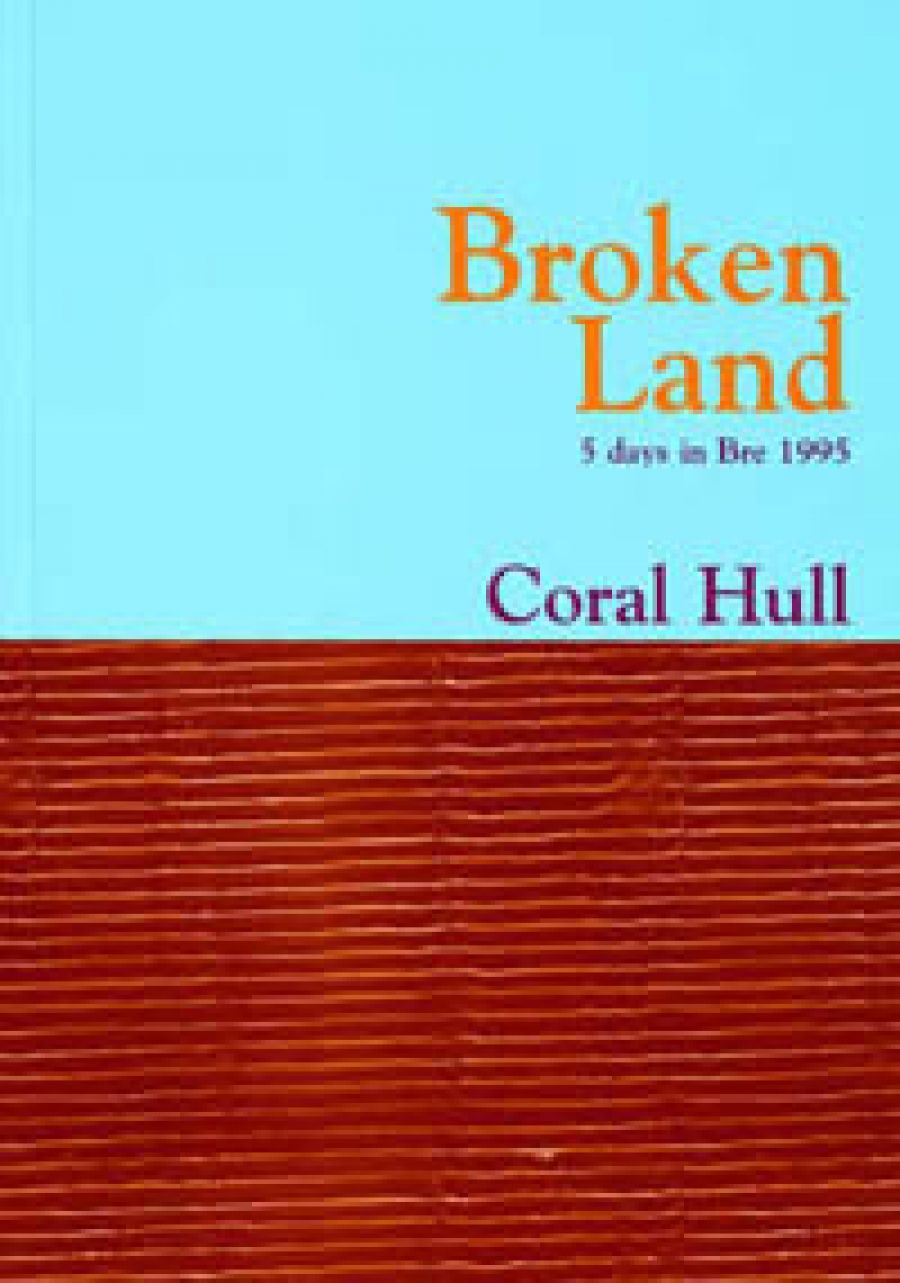
- Free Article: No
- Contents Category: Poetry
- Review Article: Yes
- Article Title: Almost Operatic
- Online Only: No
- Custom Highlight Text:
Broken Land is a collection of twelve poetic sequences which record five days spent in the small outback New South Wales town of Brewarrina (the Bre of the title). It’s a drama, almost operatic in complexity and intensity, in which the central players are Dad, a Bre man who lives in solitary retirement and ‘doesn’t own much, but he likes it that way, he likes to make do, doesn’t want a new heater or a mattress, just wants to listen to the radio, roll a smoke and check on lotto …’, and Coral, the stranger in town:
- Book 1 Title: Broken Land
- Book 1 Subtitle: 5 days in Bre 1995
- Book 1 Biblio: Five Islands Press, $12.95 pb, 68 pp
The clothes are different, the walk,
the headspace, the width & height.
Her eyes too bright, pants too tight.
She’ll be in for trouble if she isn’t careful.
I began to write about this book in terms an odyssey but on reflection decided that the journey on which it had taken me seemed more Dante-esque than Homeric. From Hull’s account, Brewarrina should be marked with a highway sign warning all about to enter to abandon hope.
Accompanying Coral Hull on her journey into Bre we experience many journeys, real and symbolic, but we don’t go as tourists: this poet’s powerful narrative voice doesn’t offer a commentary for the armchair traveller. Rather, it compels immediate involvement in the bleak and brutal world of an isolated country town which is
… small town & getting smaller by the minute,
made smaller by the minds
& all that talk
& it’s built in prejudices & grudges ...
It’s a blighted place, red with dust and blood. An arid landscape, where soil had turned to dust, rivers and lakes dried up in drought and several species of fish, birds and plants disappeared or disappearing into extinction. The Bre that Hull sees is itself on the verge of extinction. ‘My cousin said, “Chronicle the town, it’s on its last legs.” / Dad said, “We’re finished up ‘ere, the land is dead.”’
The world of Bre is a world of men; apart from Coral, the only woman I can remember is one of a group of kooris drinking ‘Down along the wall / by the weir’:
One young woman said,
‘I’ve been drinkin’
all me life
& I don’t know why.’
And it’s a world of male violence, especially towards animals: whether the gratuitous violence of ‘Punching the Piglet’ or ‘The Tourist Shooting Holiday’ (‘You just want to / break down the life & make it horizontal / over a few beers’), or the violence of slaughterhouses. Slaughterhouses? ‘You write poems about funny things’, Hull was told in one such place. She’s an animal rights activist and in the sequences ‘The Bre Roo Works’ and ‘The Goat Abattoir’ writes confrontingly and uncompromisingly about the terrible sights, smells and sounds of these killing places. I won’t be the only reader to find the latter sequence unbearably painful, not merely because of its theme but because of Hull’s passionate engagement with it and the fierce strength of the poems. She makes the final scream of a goat audible and unforgettable, an image of anguish and inhumanity.
Throughout these, and other, poems runs the refrain: ‘They know it’s wrong. / We’re finished out here.’ which Hull re-states in even plainer words: ‘I want the slaughterhouses to shut down. / I want to write poetry & then be gone.’
The poetry she’s written about ‘the broken land’ is spare and direct, given force and authenticity by the plain, natural language through which despair, desolation and horror are made real and immediate. There are voices other than her own in the poems, and one of the strengths of this work is Hull’s wonderful ability to hear the poetry of the vernacular, as in ‘Conversation With The Cockey’s Son’:
Dad said,
‘’e keeps wavin’ at me from across the road
makin’ me nervous.
Makin’ me that way I don’t wanno go inter town.’
I said, ‘Have a drink with him down the club, then.
But what are you gonna talk about?’
Dad said, ‘Wheat.’
The five days in Bre contained a range of experiences, observations, encounters and feelings and this is reflected and represented in the diversity of poetic forms and styles, through which Hull moves with impressive skill, from lines like
in my palm,
the pup’s heartbeat
travelling along my arms
until I lit up.
It was like holding warm fruit
heated by the sun.
to: ‘… I am fearful with this desire to belong, fearful that in the end, I will be cast out along the ruined land, beneath a full white moon, half living, half knowing nothing, in Muruwari country.’
Poetic projects are often unsuccessful because the project overwhelms the poetry. Broken Land is not just a project which has succeeded: it is a remarkable achievement, in which a finelycontrolled narrative is sustained by a passion made more powerful and moving by poetic restraint. It’s a long time since I’ve read such a compelling collection of poems – and one to which I know I’ll often return.


Comments powered by CComment